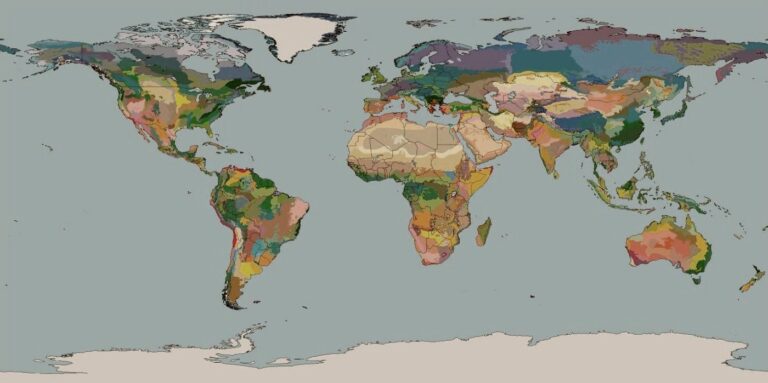by Vijay Kolinjivadi & Ashish Kothari
Without accounting for globalized production, a Green New Deal in the Global North will merely spur the imperialist quest for cheaper resources and labour to satisfy “eco-friendly” consumption.
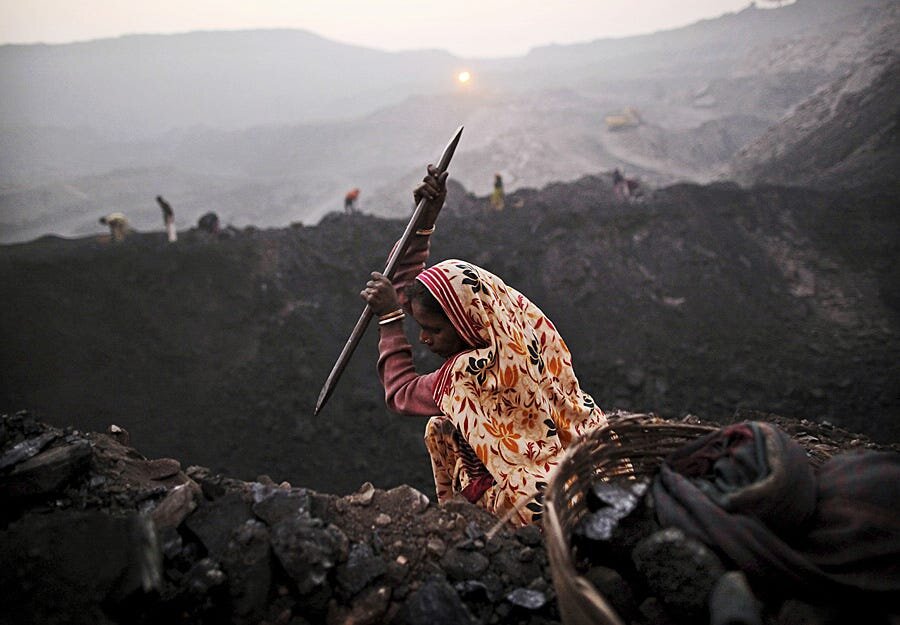
The year 2019 and the first few months of 2020 have thrown up unprecedented ecological crises. Even before COVID-19, ecological crises were raging across the world: wildfires in the Brazilian Amazon, unheard-of summer temperatures in Antarctica, record floods in the American Midwest, Europe’s prolonged summer heatwaves, and countless deaths of animals in Australia’s bushfires.
At the same time, a spate of conflict flashpoints, violent coups, and increasingly visible economic inequalities gave rise to equally unprecedented mobilizations for social change, from Chile, Ecuador, Bolivia and elsewhere in Latin America, to India, France, Lebanon, Haiti, Algeria, and Sudan. Across Europe and North America, youth movements on the streets every Friday have demanded climate justice and a future worth living in. India witnessed a general workers’ strike of 250 million people this year — the largest strike in world history. Currently, the world is grappling with a paralysis of activity on a scale never seen before, due to a microscopic virus.
While the causes of these social and ecological crises are varied and geographically-specific, there are common threads in the range of responses from citizens — calls for autonomy from oppressive states and a growing resistance to profit- and power-hungry global elites relentlessly pushing people and nature beyond the point of tolerance. Corresponding state responses have ranged from crackdowns and the vilification of movements by right-wing governments, to a semblance of positive policy moves by “green-friendly” wealthy governments like the Nordic countries. Only a few mainstream politicians have dared to fundamentally differ.
Among the most radical responses is undoubtedly the ‘Green New Deal’ (GND) manifesto of former US Presidential hopeful Bernie Sanders, and parallel statements and manifestos by former UK Prime Ministerial candidate Jeremy Corbyn. A similar proposal has also been advanced by the European Union. GNDs, in their different variations, claim to provide an alternative to the social and ecological destruction caused by the mainstream model of “development”, particularly to some of this model’s key architects, such as the fossil fuel industry. In particular, they target the devastation contributing to, and emerging from, the climate crisis.
However, it is insufficiently recognized that a GND which promises to transform economies in overly-developed regions of the world has significant implications for lives, livelihoods, and ecosystems in the “developing” world. Here, we examine the extent to which GNDs from the Global North can address systemic forces which rely on and perpetuate ecological degradation and inequality in the Global South. What do GND policies in North America or Europe imply for places like India, which continue to shoulder the costs of “progress” for privileged populations in the West and, increasingly, in cities of the Global South itself?

“What do GND policies in North America or Europe imply for places like India, which continue to shoulder the costs of “progress””
In this article, we first highlight what makes the GND unique in our current historical moment. We then describe what a GND within the Global North would imply for the Global South, unless a more internationalist outlook was adopted — both in terms of shifting the costs of development to marginalized regions of the world and the historical legacy of racialized patterns of resource extraction and wealth creation. We explain why any GND will reinforce “business-as-usual” if it fails to encompass the Global South and does not take clear positions against capitalism, statism, and patriarchy. Finally, we offer alternatives to development that a globally-integrated GND could draw inspiration from. Throughout, we draw on examples from India in particular.
How is the Green New Deal “new”?
Bernie’s version of the GND had a clear focus on both ecological and social justice issues. It heavily centred around the need to tackle the climate crisis, moving completely away from fossil fuels and towards renewable energy, while explicitly supporting people’s movements demanding such measures. Importantly, unlike mainstream climate change proposals, it emphasized the need to address social justice issues in the transition period, especially for those most vulnerable (including low-income people, ‘people of colour’, children, seniors, and the disabled). It stressed the need to create dignified, ecologically-oriented jobs for workers likely to be affected, and to place transport infrastructure and energy systems in public hands (including worker-cooperatives) instead of the fossil fuel industry. Measures for conserving public lands for “ecologically regenerative and sustainable agriculture” and ecological restoration were also included, which would have generated millions of jobs (invaluable in a period of unprecedented joblessness). The renegotiation of international trade deals to “ensure strong and binding climate standards, labour rights, and human rights” was another positive commitment. Bernie’s GND also explicitly targeted the profiteering of greedy bigwigs of the fossil fuel industry.
Bernie’s campaign, though now called off, had gained momentum on the power of social movements demanding workers’ rights and environmental justice. It did not emerge because a visionary leader vied to single-handedly accomplish radical change — especially in an American political system that is fundamentally at odds with any meaningful and progressive systemic change. Relatively recent examples from Bolivia, Venezuela, Ecuador, and Greece have shown that leftist parties which formed governments have to varying extents failed to maintain consistent and ongoing grassroots and democratically-driven political organization and socio-cultural transformation.
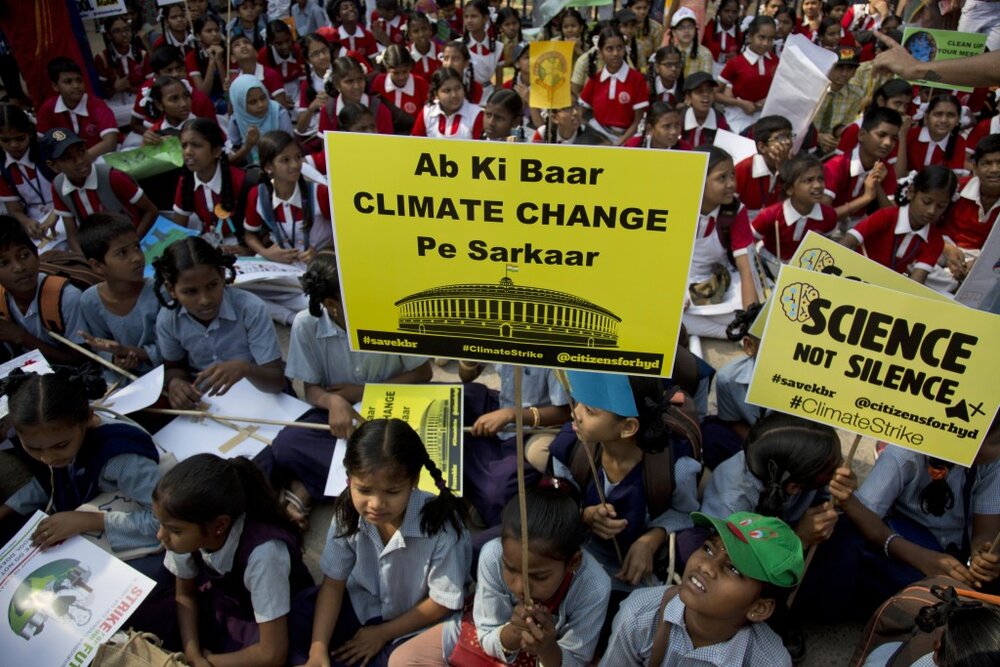
“A GND will only be successful to the extent that people’s movements rise up on an unprecedented scale to build sufficient autonomy and hold the state accountable to political and economic democracy.”
Left forces falling short of their political objectives risk a powerful backlash that right-wing forces (domestically and internationally) have often sought to exploit. Those rooting for progressive transformation need to know that a GND will only be successful to the extent that people’s movements rise up on an unprecedented scale to build sufficient autonomy and hold the state accountable to political and economic democracy. This is also known as dual power, the establishment of ‘counter-institutions’ that meet the needs of the marginalized while being run by those very people. Democracy must be re-invented in its original meaning — power of the people, not power of the people presumed to represent the people. As B.R. Ambedkar, one of the founders of the Indian Constitution and staunch defender of Dalit rights, eloquently stated in his last speech to the Constituent Assembly of India on November 25, 1949:
“[We must not] be content with mere political democracy. We must make our political democracy a social democracy as well. Political democracy cannot last unless there lies at the base of it social democracy.”
Additional crucial flaws would also severely hamper the GND’s potential for real change. Foremost, current variants of the GND retain a significant dependence on technological solutions to problems that are not necessarily technological in nature. They also say nothing about the need to reduce material consumption or energy demand overall (except ‘weatherization’ to reduce domestic consumption). Thus for example, they fail to acknowledge that even if the US transitioned completely to renewable energy and technologies like electric cars, it would still be engaging in unsustainable exploitation of nature and natural resources.
Moreover, by focusing heavily on carbon reductions, the GND ignores other major ecological crises, including those of biodiversity and ecosystem loss, driven by uncontrolled consumption in the Global North. Finally, while it commits to holding corporations accountable to domestic climate goals and labour standards, it does not ensure that they will also be held accountable globally (beyond carbon emissions). Similarly, while Bernie’s proposals were committed to ending rising inequality within the US, through taxes on fossil fuel billionaires and “green jobs” for low-income sectors, it is not clear how this inequality would be addressed in a way that does not just shift it outside the US.
As such, the GND cannot adequately challenge the structures of capitalism and patriarchy, and from a global perspective remains rooted in “green” colonialism. It effectively perpetuates the quest for cheap raw materials and black and brown labouring bodies to achieve “green” growth.
In the context of the Global South, then, the GND has failed to illustrate what is “new” about it. Put differently, it is simply inadequate, and indeed unjust, in our current hyper-connected world (laid bare by COVID-19) to limit a GND to the national policy of Global North countries.For instance, if a GND for Europe promises to be “climate neutral,” whose resources and labour will be deployed to power Europe’s unrestrained energy and consumption demands?
“The uneven playing field of resources and regulatory frameworks works in the favour of those who have not only historically usurped resources and labouring bodies around the world but also currently dictate the modus operandi of development…”
This is an especially salient question given how renewable technologies for “cleaner,” “greener” economies depend on the same socially and ecologically degrading land and labour practices as traditional energy sources. They are also conveniently located in countries of the Global South, such as Bolivia and DR Congo, where regulatory safeguards are more lax. The uneven playing field of resources and regulatory frameworks works in the favour of those who have not only historically usurped resources and labouring bodies around the world but also currently dictate the modus operandi of development, including its “greener and eco-friendly” varieties. What is easily forgotten in “eco-friendly” talk is just how development models of the Global North are structurally founded on dehumanization, in which hundreds of millions across the globe are seduced and stripped of their diverse ways of knowing the world, and dumbed down into passive consumerist onlookers and screen junkies, unable or unwilling to acknowledge (much less act upon) the consequences of their consumption patterns.
The Green New Deal as “cost-shifting” of capital?
The Torrent Power thermal power station in Sabarmati, Ahmedabad is one of India’s oldest coal-fired electricity generation plants. Ahmedabad, like many Indian cities, has some of the world’s worst air pollution levels. In Delhi, the air has been likened by Chief Minister Arvind Kejriwal as a “gas chamber” where simply breathing is akin to smoking upwards of 50 cigarettes a day. A transition to cleaner, renewable energy is needed more than ever, to combat the daily plight of billions in rapidly “developing” countries dealing with intolerable pollution and massive displacement and dispossession for mining, power stations, and transmission lines, and for the global fight against climate change.
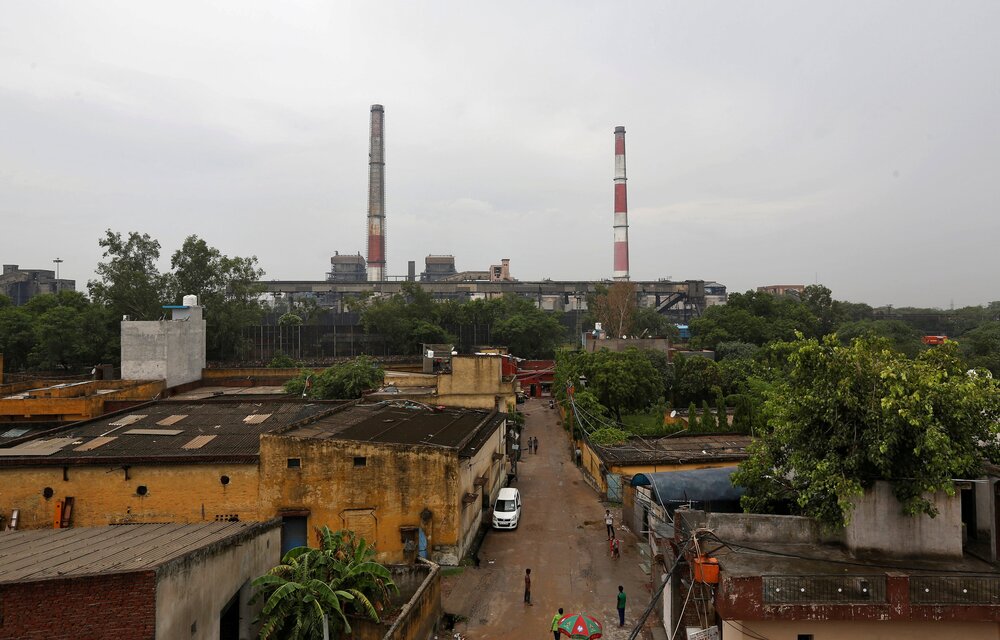
Yet, in a world beholden to the imperatives of global capitalism and statism, “finance-rich, resource-poor” countries are increasingly looking to “resource rich” countries in the Global South to secure their food and energy needs. While traditional players (e.g. North America and Europe) that have been on the “frontier” of imperialist pursuits are still in the game, new players like India and China also want a piece of the pie. Indeed, the very notion of “national development” is becoming increasingly irrelevant in an era when state-backed transnational corporations are active in dispossessing people of their lands and their food and cultural sovereignty domestically, regionally, and globally. India, for example, is active both internally in ‘land grabbing’ strategies for biofuel, industrial development, business parks, and transport infrastructure, and abroad in fueling the investment boom in mineral deposits or agro-industrial projects. Indian companies (backed by their government) are involved in “green energy” production in Chile’s Atacama Desert under the aegis of “sustainable development” in the mining sector, and in grabbing enormous amounts of farm and pasture land in Ethiopia, ostensibly to help the local economy.
“GND must overhaul the “cost-shifting” culture that globalized development requires; this is very different from merely transitioning to a more efficient “green” energy economy.”
Without paying attention to the broader political economy of globalized economic production that transcends national borders, a GND in Europe, US, Canada, South Korea, and its variants in China (e.g. “Ecological Civilization”) will be mere window dressing to conceal an underlying imperialist quest for cheap nature and cheap labour to satisfy the (increasingly “eco-friendly”) demands of the wealthiest people. In other words, the GND must overhaul the “cost-shifting” culture that globalized development requires; this is very different from merely transitioning to a more efficient “green” energy economy.
In India, where solar energy generation has become the cheapest in the world, the transition to renewable energy generation could not be a greater blessing. But while decentralizing energy production to ensure clean energy sovereignty at the panchayat or urban municipal level is one ray of hope, transitioning entire coal-based mega-cities to maintain and enhance commerce and production through industrial renewable energy generation is an entirely different matter. The move towards more efficient transport infrastructure, like electric vehicles, and proliferating digitization and wifi-enabled devices across all sectors of the economy has offered opportunities to leapfrog away from dirty oil and gas industries. At the same time, it has spurred the quest to acquire land and mineral raw material domestically and abroad to secure such production.
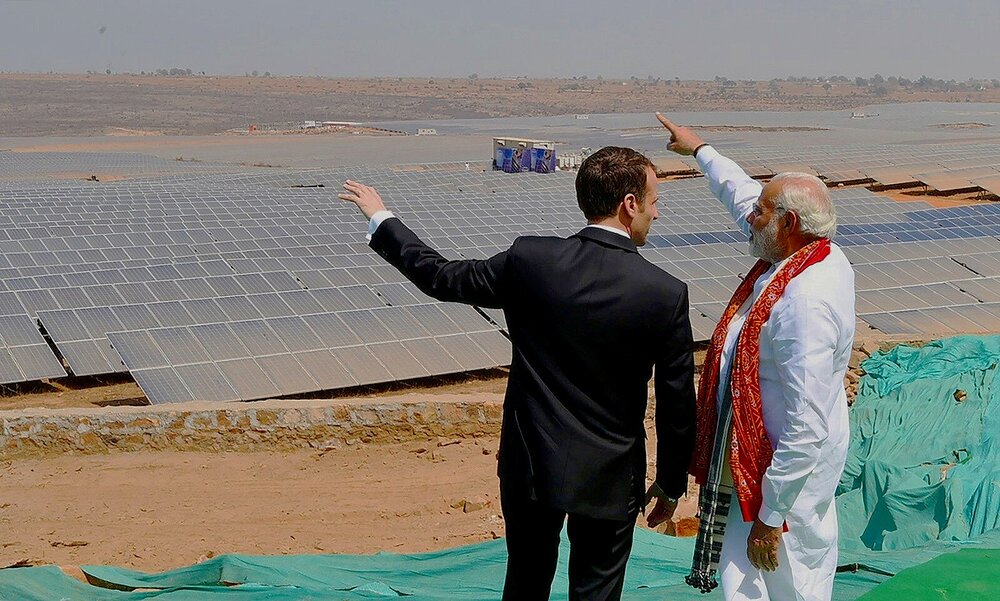
India’s plan to transition all vehicles to electric power in a decade will require an extraction-oriented race “on a war footing” with China to acquire critical lithium and cobalt reserves in places like the Congo, Bolivia, and Chile. Lithium-ion batteries, cobalt, neodymium, silicon, and coltan are crucial for electric vehicle car-batteries, computers, and mobile devices. Increasing demand for these commodities from the world’s largest companies, including Google, Apple, and Microsoft, has resulted in some of the most deplorable working conditions in the world, where pregnant women are often powerless to prevent themselves and their children from working in the mines. It has also directly perpetuated one of Africa’s longest running armed conflicts.
Harm reduction in India, in its move away from polluting coal and unbreathable air towards a hi-tech society, fuelled by renewable energy, means harm creation in the Congo where lives deemed less valuable are made to shoulder the cost. It also means harm creation domestically, in the grasslands of Kachchh and Andhra Pradesh, the coasts of southern India, and the desert of Rajasthan, where wildlife, farmers and pastoralists face ever-increasing takeover of the territories they depend on.
Of course, we cannot draw direct comparisons between countries of the Global North and South in their capacity to adopt GND policies. As Alex Lenferna claims in arguing for a “Global Green New Deal,” the ability to enable large-scale stimulus packages that inject money into the economy is only viable for Global North countries who can do so at very low interest rates, backed by high credit ratings. In turn, this is enabled by historical wealth usurped from former colonies and more recently from multi-national corporations based in the North. In contrast, countries across Latin America, Africa, and Asia remain bonded by debt in a neoliberal economy, with IMF-imposed structural adjustment policies stifling any investment in public policies and infrastructure.
Racial capitalism, (eco)fascism, and the Green New Deal
The “no harm here is still harm there” narrative explained above reflects all the trappings of a global class war, with divisions along racial, class, and gendered lines. At the same time, rising border imperialism, justified increasingly in ethno-nationalist and xenophobic terms, is ensuring that these divisions of labour reinforce conditions perpetuating the precarity of lives on the margins. The recently established National Registry of Citizens (NRC) and Citizenship Amendment Act (CAA) in India, rooted in a Hindu supremacist vision of “development” and castigating any dissent against this vision as “anti-national”, is a case in point. The muscling up of Modi’s India to meet the resource-imperialist requirements of global capital allows India the space to not only extract global resources and labour, but also to close its eyes and victimize anyone suffering from the consequences. This is no different from the US under Trump, Brazil under Bolsonaro, Turkey under Erdogan, and other states under ruthless and plutocratic regimes.
Some have also pointed out that a GND which treats climate change as a ‘threat’ to security itself irresponsibly implies that the status quo (presumably without climate change) is somehow ‘secure’. For the billions of black and brown bodies that serve as the crude raw materials for production, for women whose regenerative and affective labour at home and in the workplace goes unrecognized, for those Indigenous populations whose worldviews have been systematically destroyed, and the millions of non-human species being pushed over the edge of extinction, the status quo is anything but secure.
This framing of ecological crises as security threats also risks opening the door to disturbing Malthusian implications. In the 1968 book, The Population Bomb, author and environmentalist Paul Ehrlich described a New Delhi slum from his taxi window as a “hellish mob,” describing his fear of being unable to return to his hotel and his recognition of “emotionally” experiencing what he called “over-population.”
This perception is rooted in the fear that more bodies seeking a “good life” would not be sustainable for those who already hold such privileges. This imagery around “threat” serves to erase the real burden of environmental destruction – the richest 10% of the population is responsible for 50% of global emissions; in India the richest person consumes 17 times the poorest. Thus, a GND which considers the climate crisis as a threat, without acknowledging stark inequality in global consumption, can be readily repackaged in ecofascist terms.
Note: A shortened version of this article was published in Undisciplined Environments.
Vijay Kolinjivadi is a post-doctoral researcher at the Institute of Development Policy, University of Antwerp in Belgium.
Ashish Kothari is based in India. He is associated with Kalpavriksh, Vikalp Sangam, and Global Tapestry of Alternatives.




